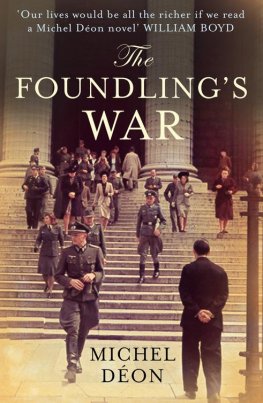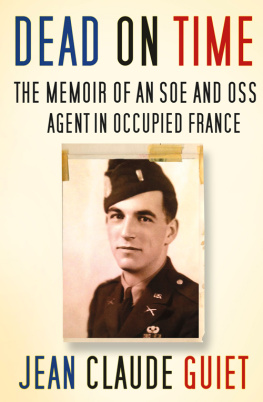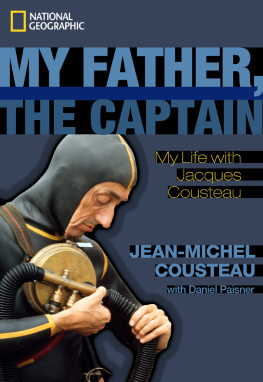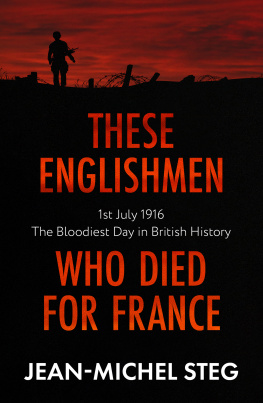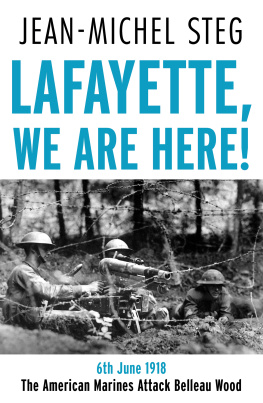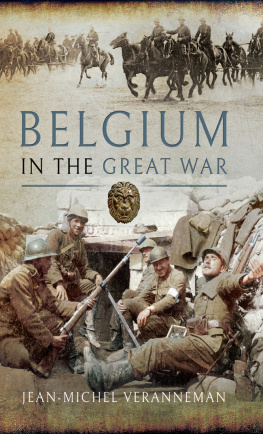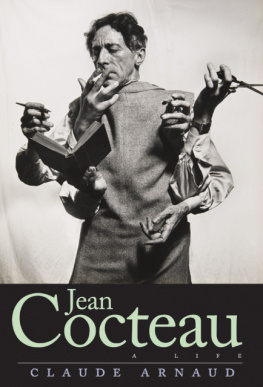Michel Don
The Foundling's War
Jeans view of the band as it turned into the avenue leading to Place de Jaude, was obstructed by Palfys nose. It had always been of noble dimensions, with nicely arched nostrils that quivered particularly sensitively at the smell of grilling meat or a ripe Camembert but never, never before had it aspired to block an entire avenue. From the front, Palfys nose suited his bony face, and its bump, emphasised above its bulbous tip by a white scar, actually seemed somehow cheerful and promising. But then suddenly, seen from the side, it underwent a curious mutation: protruding, it transformed Palfys expression utterly, turning him into a sort of predator, a gourmand (or sensualist, if you like) of an extreme and quite possibly sadistic kind. Abruptly his eyelashes seemed too exquisitely brushed, his eyes to retreat into their orbits, exaggerating the pink, living caruncle into a pustule at the corner of the eye, and his arched nostril revealed the cartilage inside, as smooth as the wall of a cavern.
Jean told himself he must never really have seen his friends face in profile before, which was both a pretty peculiar and pretty improbable state of affairs, given that they had known each other for three years and been through nine months of fighting together, eating from the same mess tins, sleeping on the same straw, throwing themselves down in the same mud. He had had to sit at a caf terrace in Clermont-Ferrand on a July morning in 1940 to discover Palfys nose for the first time. How long would it take to get to know the rest of his face? Jean closed his eyes and tried to imagine Palfys hands. His attempt to conjure up a precise picture of them was unsuccessful and when he opened his eyes again the band, having filed past Palfys nose, had arrived at the caf. Children dashed along the pavements. Women in sleeveless dresses waved. One of them stopped in front of the caf terrace, and through the thin blue lawn of her dress the sunlight outlined soft thighs, delicious hips, and a slim back. For a second or two she stood without moving, offered to their gaze, an unknown, fragile-looking young woman with ash-blond hair falling over her cool neck. She turned to walk away and her face appeared with its childlike nose, pale lips and sun-lightened eyebrows.
Did you see? Jean said.
Yes. We are visited by grace herself.
Fleetingly!
However fleeting, she must always be acknowledged. And we shall see her again.
She might be really stupid.
I guarantee she wont be! Palfy declared, in a tone that brooked no contradiction.
Sergeant Titch was passing them now, chest out, marching stiffly, tossing his beribboned baton high above his head. The band followed, drummers first, ahead of the buglers, whose instruments festooned with blue pennants embroidered with a red design a devil and his lance glinted in the sunlight. These gaitered, white-gloved cherubs, cheeks bulging under their greased and gleaming helmets, were being menaced from behind by Pegasone, the strawberry roan mare of Colonel Vavin, a fine figure of an infantryman on horseback. Mounted uneasily in his saddle, the colonel, knowing the mare hated the cacophony of brass and drums, feared she would throw him at any moment. And behind Pegasone lay further danger in the shape of the baby-faced subaltern who, flanked by heavily decorated NCOs, was carrying the regimental standard at far too acute an angle, threatening Pegasones hindquarters with its metal spike. One false move and she would be off.
Come on! Palfy said.
Jean looked for a waiter to pay for their beers.
What are you doing? Palfy asked.
I cant see the waiter.
Dont you know that we won the war? Have you ever seen the winning side pay for its drinks? Lets get out of here.
They dived into the crowd, which grew thicker as they approached Place de Jaude.
I think youre overstating it, Jean grumbled. We didnt win the war. In fact I dont think we can ever have lost a war as shamefully as we did this one.
Palfy shrugged.
We must have won. At the last minute it all worked out for us. The miracle of the Marne. La furia francese. Otherwise theyd never dare parade like this.
The regiment flowed into the square, its companies marking time as they waited to take up their positions in front of an empty stage backed with red curtains that looked like an open mouth. Squeezed into khaki jackets buttoned to the throat, trussed up in cartridge belts stuffed with bread, chocolate and tobacco, and weighed down by new cleated boots that threw sparks as they hit the ground, the soldiers looked as though they were on the verge of apoplexy. Company sergeant-majors, lieutenants and captains scuttled back and forth, issuing orders to their companies that were raggedly obeyed. Rifles were stacked, and at a signal from section NCOs each man pulled a rag out of his cartridge belt to polish his boots. An admiring ah! of astonishment ran through the crowd massed on the pavements, held back with some difficulty by a police cordon. A new era was dawning. Groomed and gleaming, newly issued with MAS-36 rifles (prudently kept back during the fighting to make sure the old rifles from 191418 were used first), the regiment with its distinctive red epaulettes and dashing, self-important officers seemed to have survived its recent battles without so much as a scratch or losing a single one of the buttons Gamelin had promised to the government.
When the boots were polished, the rifles were unstacked and companies lined up once more. An official in a black-edged jacket, stiff collar, striped trousers and bowler hat appeared on the platform. He scrutinised the two rows of chairs, looking for the one with his name on. He looked like a clown or a tiny Jonah, about to be swallowed by the curtains open mouth. Having found his seat, he settled himself, mopped his brow, and suddenly saw that more than a thousand spectators had him in their sights. Swiftly replacing his bowler, he disappeared as if swallowed by a trapdoor, followed by a wave of laughter.
Moments later, the prefect made his entrance. Instructions rang around the square and battalion commanders ordered their men to shoulder arms.
Jean and Palfy found themselves in the front row, among the ex-servicemen, who wore their berets tugged down over their ears and carried children on their shoulders. Jean could have named nearly every officer and NCO now standing to attention in the square, but the veterans of the regiment the men who had still been fighting three weeks earlier had been redistributed among the re-formed companies, which had then been joined by the last contingent to arrive. He and Palfy recognised Hoffberger, fat as ever, and the huge Ascary, little Vibert, still furious-looking, the seminarian Picallon, their friend the boxer Lonard, and Negger, the pacifist primary-school teacher all of them easily distinguishable from the young recruits drummed up after the armistice by their visibly casual way of standing to attention.
I can hear Ascary swearing, God oh God oh God in heaven, Palfy said.
And Hoffberger going hmmph.
Good to see theyre both still with us.
To tell you the truth, Jean said, Id prefer to see that nice blonde, the one we saw just now with the sun behind her.
Is that all you can think about?
A general was inspecting the regiment. When the inspection was finished, it was time to award the decorations. Colonel Vavin added a bar to his Croix de Guerre, which already reached his belt. Three captains and four lieutenants received the official embrace. Next it was the NCOs turn. A dozen sergeants fell out.
You see, we won the war. No question about it, Palfy said.
Next to them, an ex-serviceman curiously sporting a faithful copy of a Hitler moustache hissed at them, Shut up, you bloody layabouts!

